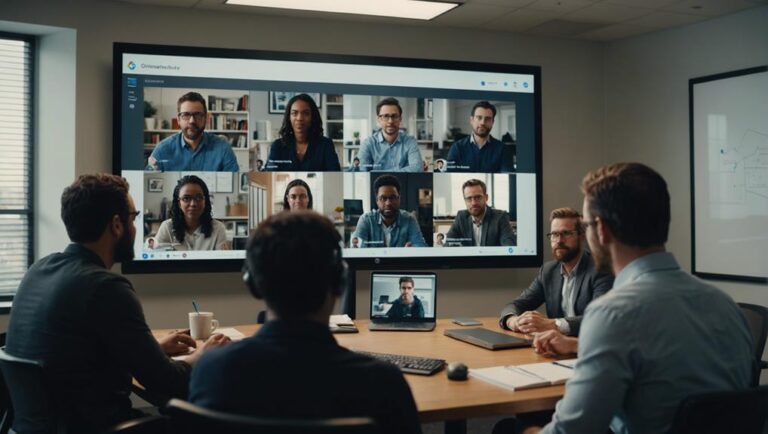Remote Work Team Dynamics: Managing Different Personality Types
In remote work team dynamics, understanding and managing diverse personality types is essential. Different traits offer varied perspectives and skills, enriching collaboration. Recognizing and leveraging these differences can lead to more effective problem-solving and decision-making. Tailoring communication styles optimizes clarity and engagement, fostering a positive environment. By embracing varied viewpoints and building trust, teams can enhance productivity and job satisfaction. Establishing clear boundaries and utilizing project management tools are key in remote settings to keep everyone aligned and informed. Successfully managing personality types can ultimately lead to a more cohesive and innovative team dynamic.
Personality Types in Remote Teams
Understanding the diverse personality types present in remote teams is fundamental for fostering effective communication and collaboration.
Team bonding is essential for remote teams to function cohesively. Individuals with varying personality traits can contribute positively to team dynamics, offering different perspectives and skills. However, these differences can also lead to conflicts within the team.
Conflict resolution becomes paramount in such situations to maintain a harmonious work environment. Research shows that remote teams that invest in understanding each other's personality types and preferences are better equipped to handle conflicts constructively.
By recognizing and appreciating the unique traits of each team member, remote teams can enhance team bonding and communication. Implementing strategies tailored to different personalities can help prevent misunderstandings and improve overall team performance.
Effective conflict resolution strategies, such as active listening and compromise, play a critical role in ensuring that conflicts are addressed promptly and effectively in remote teams.
Communication Styles Analysis
As you analyze communication styles within your remote team, consider the varied communication preferences team members might have.
Tailoring your messages effectively to cater to these preferences can enhance overall team communication.
Promoting active listening among team members can also foster better understanding and collaboration in virtual settings.
Varied Communication Preferences
Different team members exhibit distinct communication styles, which can greatly impact the dynamics of remote work teams. Communication challenges arise when team members have varied preferences in how they like to communicate. Some team members may prefer quick instant messages for efficient communication, while others might prefer detailed emails to guarantee clarity. Understanding these preferences is vital for effective virtual team building.
In remote work settings, virtual team building becomes essential to foster a sense of camaraderie and collaboration among team members. However, these efforts can be hindered if communication preferences aren't taken into account. For example, team-building activities that heavily rely on video calls may not resonate with team members who prefer written communication.
It's important to find a balance that accommodates different communication styles to make sure that all team members feel included and valued.
Tailoring Messages Effectively
Tailoring messages effectively in remote work team dynamics involves analyzing communication styles to optimize clarity and engagement. Feedback delivery plays an essential role in this process. Understanding how different team members prefer to receive feedback is vital for guaranteeing that your messages are well-received and acted upon.
Some individuals may prefer direct and constructive feedback, while others may respond better to a more diplomatic approach. By tailoring your feedback delivery to suit each team member's communication style, you can foster a more positive and productive work environment.
Communication techniques also play a significant role in tailoring messages effectively within remote teams. Utilizing various communication channels such as video calls, instant messaging, and email can help accommodate different preferences and ensure that important information is effectively conveyed to all team members.
Additionally, adapting your language and tone to match the recipient's communication style can enhance understanding and engagement within the team. By employing these strategies, you can tailor your messages effectively to suit the diverse communication styles present in remote work team dynamics.
Promoting Active Listening
Effective communication in remote work team dynamics hinges on promoting active listening through thorough analysis of communication styles to enhance understanding and collaboration among team members.
Active listening involves not just hearing words but also understanding the underlying emotions and intentions conveyed. It's vital for remote teams to provide effective feedback, considering the diverse communication styles present within the group.
By actively listening, team members can tailor their responses appropriately to each individual, fostering a more productive and harmonious work environment.
Building trust is closely linked to active listening, as it demonstrates respect for others' viewpoints and experiences. Through active listening, team members can validate each other's perspectives, leading to a more empathetic team dynamic.
This fosters a sense of belonging and encourages open communication among team members, ultimately strengthening relationships and improving overall team performance.
Managing Work Preferences
Consider how understanding and accommodating individual work preferences can enhance team productivity and collaboration in a remote work setting. Establishing clear remote work boundaries and respecting team members' preferences is vital for maintaining motivation and preventing burnout.
Productivity tips tailored to individual work styles can greatly impact work-life balance in a remote team.
Research suggests that flexible work arrangements, such as remote work, can lead to increased productivity and employee satisfaction. However, to fully reap these benefits, it's essential to recognize and adapt to the diverse work preferences within the team. Some team members may thrive in a structured work environment with set schedules, while others may prefer more flexibility to accommodate personal responsibilities.
Strategies for Team Collaboration
Understanding the dynamics of team collaboration in a remote work environment is essential for fostering effective communication and achieving shared goals. To enhance virtual engagement and overcome remote challenges, implementing specific collaboration techniques is pivotal.
Team building activities play a significant role in fostering a sense of unity among remote team members. Utilizing virtual icebreakers, team challenges, and online team-building games can help create a cohesive and connected team environment. Regular video meetings and virtual coffee breaks can also enhance team collaboration by providing opportunities for informal interactions and relationship building.
Encouraging open communication channels and setting clear expectations for remote work collaboration are imperative for ensuring that all team members are on the same page. Utilizing project management tools and establishing regular check-ins can help keep everyone accountable and informed about project progress.
Leveraging Differences for Success
To achieve success in remote work team dynamics, it's essential to leverage the benefits of personality diversity. Understanding and appreciating different personality traits can lead to more effective collaboration strategies.
Personality Diversity Benefits
Diverse personality traits within a remote work team can serve as a powerful catalyst for innovation and problem-solving. When team members bring a variety of perspectives, approaches, and strengths to the table, it fosters an environment rich in creativity and critical thinking. Research indicates that personality diversity not only enhances team cohesion but also leads to a significant productivity boost.
Teams composed of individuals with different personality types are more likely to excel in tasks that require varied skills and ways of thinking. For example, introverted team members may excel at detailed-oriented tasks, while extroverted members may thrive in roles that involve networking and communication. By leveraging these differences, teams can tackle challenges from multiple angles, leading to more thorough and effective solutions.
Moreover, diverse personalities can enhance decision-making processes by bringing in unique viewpoints and considering alternative perspectives. This dynamic can prevent groupthink and encourage innovative thinking.
Collaboration Strategies for Success
Leveraging the distinct strengths and perspectives of team members is vital for optimizing collaboration and achieving success in remote work environments. When it comes to conflict resolution, embracing diverse viewpoints can lead to more creative problem-solving and innovative solutions. Research shows that teams that effectively manage conflicts by considering different perspectives outperform those that avoid or suppress disagreements.
Building trust is another essential aspect of successful collaboration. Trust is the foundation of strong working relationships, especially in remote teams where face-to-face interactions are limited. Establishing trust among team members can enhance communication, foster mutual respect, and increase overall productivity. Studies suggest that high levels of trust within a team are positively correlated with job satisfaction and performance.
Enhancing Remote Team Dynamics
Improving communication channels and fostering a strong sense of trust among remote team members are key factors in enhancing remote team dynamics. Effective team building activities can help create a sense of camaraderie and shared purpose among virtual team members. Regular virtual team building exercises, such as online games, virtual coffee breaks, or collaborative projects, can strengthen relationships and boost team morale.
Additionally, establishing clear communication protocols and utilizing various communication tools can enhance collaboration and productivity within remote teams. Conflict resolution is another critical aspect of enhancing remote team dynamics. Encouraging open and honest communication when conflicts arise can help address issues promptly and prevent misunderstandings from escalating.
Implementing structured conflict resolution processes, such as setting up mediated discussions or involving a neutral third party when necessary, can facilitate the resolution of conflicts in a constructive manner. By prioritizing effective communication and conflict resolution strategies, remote teams can foster a positive and productive working environment.
Conclusion
In summary, managing different personality types in remote work teams is essential for success. By understanding communication styles, work preferences, and leveraging differences, teams can enhance collaboration and productivity.
Remember, 'variety is the spice of life,' and embracing diversity in remote teams can lead to innovative solutions and a strong sense of unity.
Keep these strategies in mind to foster a harmonious and effective remote work environment.







